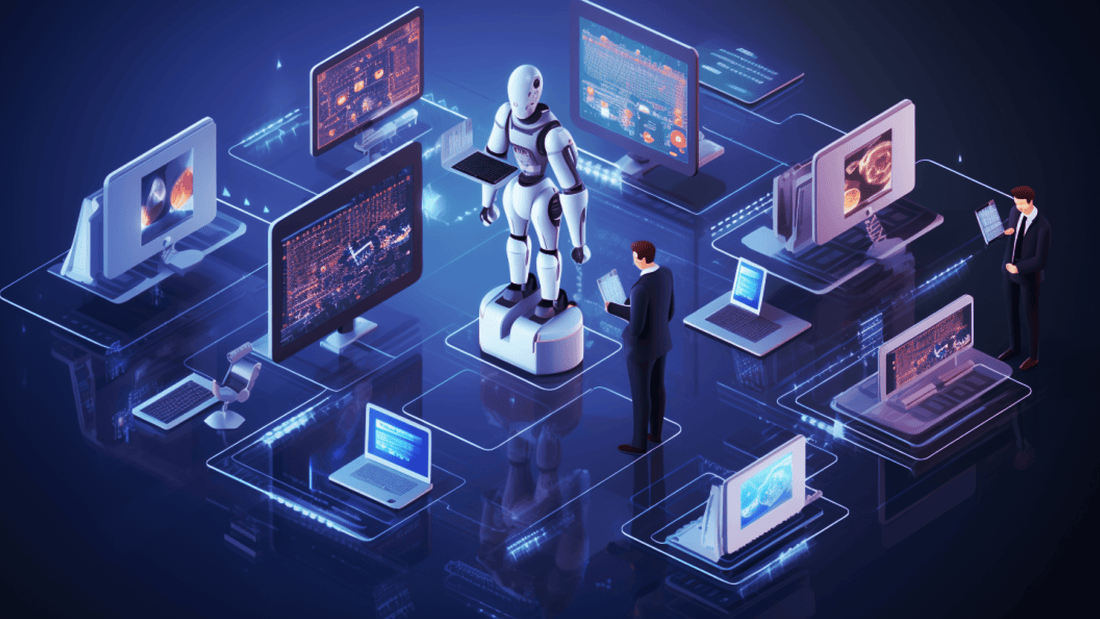
The Future of AI in Business: Automating Workflows for Maximum Efficiency
Share
Artificial Intelligence (AI) has emerged as a transformative force in the business world, reshaping how organizations operate, innovate, and compete. From automating repetitive tasks to enhancing decision-making, AI is driving efficiency and unlocking new opportunities across industries. This article explores the role of AI in business workflow automation, its benefits, challenges, and what the future holds for AI-driven enterprises.
The Role of AI in Workflow Automation
AI-powered tools and platforms are revolutionizing traditional workflows by automating time-consuming and repetitive tasks. By leveraging machine learning (ML), natural language processing (NLP), and robotic process automation (RPA), businesses can streamline operations, reduce costs, and focus on strategic initiatives.
Applications of AI in Workflow Automation
- Customer Support: Chatbots and virtual assistants handle customer queries, provide solutions, and reduce response times.
- Data Processing: AI automates data entry, analysis, and reporting, ensuring accuracy and saving time.
- Marketing Automation: AI tools optimize ad campaigns, personalize content, and analyze consumer behavior.
- Human Resources: AI streamlines recruitment by scanning resumes, scheduling interviews, and assessing candidates.
- Supply Chain: Predictive analytics and automation improve inventory management, logistics, and demand forecasting.
Benefits of AI in Workflow Automation
The integration of AI into business workflows offers numerous advantages:
1. Enhanced Efficiency
AI eliminates manual processes, speeding up task completion and reducing the likelihood of errors. For example, in manufacturing, AI-powered robotics perform assembly tasks with unmatched precision and consistency.
2. Cost Reduction
By automating labor-intensive tasks, businesses can lower operational costs and allocate resources to higher-value activities. Automation also reduces waste and optimizes resource utilization.
3. Improved Decision-Making
AI-driven analytics provide actionable insights by processing vast amounts of data in real time. This enables businesses to make data-informed decisions, anticipate trends, and adapt to market changes.
4. Scalability
AI systems can handle increasing workloads without requiring proportional increases in resources, making it easier for businesses to scale operations and expand into new markets.
Challenges and Ethical Considerations
While AI offers transformative potential, it also poses challenges and ethical dilemmas that must be addressed:
1. Data Privacy and Security
AI relies on large datasets to function effectively. Businesses must ensure data is collected, stored, and used responsibly to protect customer privacy and comply with regulations.
2. Workforce Displacement
Automation may lead to job displacement in certain sectors. Companies must invest in reskilling and upskilling programs to help employees transition to new roles.
3. Algorithmic Bias
AI systems can inadvertently perpetuate biases present in training data. Businesses must implement measures to ensure fairness and inclusivity in AI applications.
4. Implementation Costs
Deploying AI solutions can be expensive and complex. Small and medium-sized enterprises may face barriers to adoption due to limited resources.
The Future of AI in Business
The future of AI in business is bright, with advancements in technology opening new possibilities for innovation and efficiency. Key trends to watch include:
- Hyperautomation: The integration of AI, RPA, and other technologies to automate end-to-end processes.
- AI as a Service (AIaaS): Cloud-based AI solutions that make AI tools more accessible to businesses of all sizes.
- Collaborative AI: AI systems designed to augment human capabilities rather than replace them, fostering a partnership between humans and machines.
- Explainable AI (XAI): Efforts to make AI systems more transparent and understandable, building trust and accountability.
Conclusion
AI is revolutionizing business workflows by automating tasks, improving efficiency, and driving innovation. While challenges remain, the potential benefits far outweigh the risks, making AI an essential tool for businesses striving to stay competitive in a rapidly changing world. As AI technology continues to evolve, organizations that embrace and adapt to these changes will be well-positioned for sustainable growth and success.
